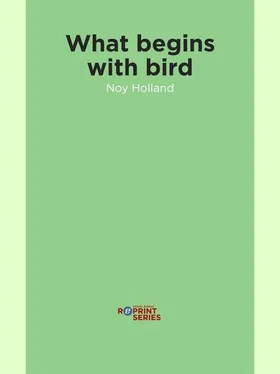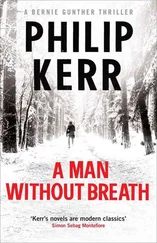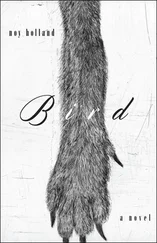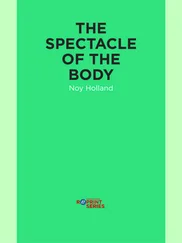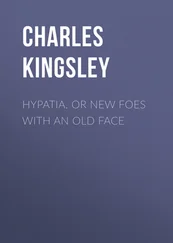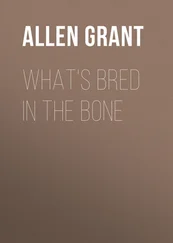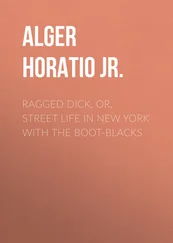Noy Holland - What begins with bird
Здесь есть возможность читать онлайн «Noy Holland - What begins with bird» весь текст электронной книги совершенно бесплатно (целиком полную версию без сокращений). В некоторых случаях можно слушать аудио, скачать через торрент в формате fb2 и присутствует краткое содержание. Год выпуска: 2015, Издательство: Dzanc Books, Жанр: Современная проза, на английском языке. Описание произведения, (предисловие) а так же отзывы посетителей доступны на портале библиотеки ЛибКат.
- Название:What begins with bird
- Автор:
- Издательство:Dzanc Books
- Жанр:
- Год:2015
- ISBN:нет данных
- Рейтинг книги:3 / 5. Голосов: 1
-
Избранное:Добавить в избранное
- Отзывы:
-
Ваша оценка:
- 60
- 1
- 2
- 3
- 4
- 5
What begins with bird: краткое содержание, описание и аннотация
Предлагаем к чтению аннотацию, описание, краткое содержание или предисловие (зависит от того, что написал сам автор книги «What begins with bird»). Если вы не нашли необходимую информацию о книге — напишите в комментариях, мы постараемся отыскать её.
, once again finds her pushing the boundaries of language and rhythm with her writing. Delving into family relationships, frequently with female protagonists, Holland’s writing develops a tension, both in the situations written of, and in the writing itself.
What begins with bird — читать онлайн бесплатно полную книгу (весь текст) целиком
Ниже представлен текст книги, разбитый по страницам. Система сохранения места последней прочитанной страницы, позволяет с удобством читать онлайн бесплатно книгу «What begins with bird», без необходимости каждый раз заново искать на чём Вы остановились. Поставьте закладку, и сможете в любой момент перейти на страницу, на которой закончили чтение.
Интервал:
Закладка:
“What are you doing?” Libby screamed. She held the baby against her. The baby was quiet. She hit her sister across the mouth. “What did you think you were doing?”
“She was swimming,” Rose said. “She liked it.”
It was true that the baby was quiet. Its little mouth was open, it was waving its little hands — a baby newly enough from the womb that it could still do that, hold its breath and swim like that. It had not forgotten yet how to do that.
When it was dark outside and the wind had quit and the baby was in its crib asleep, Libby’s husband came in. Rose heard him, big as he was, walk down the hall with his toolbox.
She tried to get the dog to sleep with her, tried to trap it underneath the covers. Rose patted the sheet, and tugged on the dog’s collar, but the dog, when it jumped on the bed, only jumped right off again. She gave up. She swung the door shut to keep the dog in her room, and flipped the light off.
The beds the one that Rose was in, and the one where Libby and her husband slept — were side by side, pushed against opposite sides of the wall. Rose listened for them through the plaster. She waited until they were quiet, until Libby and her husband seemed to be asleep, and then she went in to look at the baby. The baby was sleeping. It was making little sleeping sounds. The dog sat beside Rose and whimpered.
She went into the kitchen. She got Big Bear’s plate from the dish rack and toasted four frozen waffles, heaped them with ice cream and chocolate sauce and ate them in the dark in bed. She let the dog lick the plate when she had finished. This time, when she patted the covers, the dog jumped up in the bed.
She dreamed: they were with the dog, she and Libby, among the mountains. There was snow still, in patches, and moss that grew over their knees. In the snow was an overturned pickup truck she and Libby climbed out of. Their clothes were torn. They looked for wounds, for broken bones. They found the baby — not Libby’s baby, but the tiny thing that Rose felt drop into the toilet in the hospital — beginning to grow on her tongue.
Rose waked, and Libby and the dog and the baby waked, all at once before the sun: Big Bear had burned his toast. The dog got up. Rose lay in bed, listening, remembering she had turned the toaster to High to toast her frozen Eggos. She pulled her robe on, and let the dog out. She stood in the doorway, watching, in the light from the house, the dog following its nose.
It was dark still; the wind had not started to blow. Smoke was rising in columns from the concrete plant and drifting out over the plains, over a band of cottonwoods bent over a path of stones that had once been the bed of a river.
The boat was gleaming, bottom-up in the grass in the yard.
Rose tried to remember her dream. She remembered, instead, that she walked in her sleep for years before she moved from home, when home was a lush, dampened place, a county of hills and fences. In her sleep, she buried her family’s shoes in the sawdust pile beside the barn. She waked herself in shopping malls, on roadways, in neighbors’ yards — in places, some nights, she had never been and did not know how to go home from.
One night she waked, lying in a dew, in grass so tall she saw only leaves, threaded and sharp, and limpid stems, nodding their glossy heads. Something was eating toward her: she had fallen asleep in a field of cows. When a few of them found her, others came. They stood above her, flank to flank wide, wet, eyelashy eyes and dished cow faces, waiting to see what she would do.
She went in to look at the baby. “Hey, pretty girl. What you doing?” she said.
She shook the crib for the baby. She pinched a piece of lint from its mouth.
“Mkgnao,” she said. “Hulululu. Wakey, wakey, Baby.”
The baby lay there. Rose picked it up, cupping its head the way she remembered seeing her sister do. She remembered the place where the bone had not met on the top of the baby’s head, the dent you could press your thumb against and count the heartbeats through. She counted to twelve, or seven, and started to count again.
When they were five and six, the girls, when they were of an age for dolls, they loved the same blonde limbless thing until a day they fed it, set it to sit in the high chair where the girls themselves had used to sit, with the spoon they had learned to eat from. When Rose pulled the doll’s hair to bend back its neck to dribble ice cream into its mouth, the doll’s eyeballs had dropped from their sockets and fallen into its head. It was something she had nearly forgotten.
Rose remembered, as a rule, very little:
A sheepdog drowned in the swimming pool in the year her hair was pixied.
She remembered her hair in a pixie.
She remembered a moose with removeable wounds, meaty pieces you could lift out and stick back in again.
Rose carried the baby out through the garden, feeling in her feet, her feet were bare, how the ground dipped and cooled in the beds, dampish where she had run the hose where she and Libby had dug up the iris.
She called, “Here, boy. C’mere, boy.”
The dog came to her, smelling of sage, and walked along at her heels. They walked across the flagstone and over the shrivelled grass.
Where the grass stopped, the hogback began to slope away. At the foot of the slope were heaps of slag that grew, year by year, beside the concrete plant. A few lights went off in the concrete plant.
The baby fumbled at her, hungry.
“Are you hungry?” she said.
The dog whimpered.
“Not you,” she said to the dog.
But the dog bucked and jumped at her feet to show that it was hungry. It trotted back to the house with its nose to the ground, looking for its bowl.
Rose pulled her robe across the baby. She started down over the hogback. Goatheads grew on the hogback, low along the ground. They had pale stems and narrow leaves you never saw until you walked into a patch of them, which is what Rose did. She tried walking first on the sides of her feet, where the skin was thick, and then on tip-toe. She tried stopping and standing on one foot to pull a few thorns from the other foot, feeling with her fingers for the thorns that had worked into the tendcrest places. The baby cried, and the thorns on the foot Rose was standing on pushed in even deeper.
She went on. Behind her, a door squeaked open. The dog arrived with its bowl in its mouth and, picking its way among the thorns, walked along with her down the hill.
She was walking to a flat stone she remembered having sat on. The stone had been painted white, and the air around it looked lighter. It looked bigger, the stone, than it really was, as big to her as a smallish boat moored against the heaps of slag the chalky dust blew off of.
The dust was in her mouth, her eyes, she couldn’t see quite. She saw the rim of the plains grow lighter, and the stone seemed to move away.
The dog dropped the bowl in the path they had walked and walked to the stone to watch her. She remembered the meat in her pocket. She had Big Bear’s fork in her pocket.
“Watch me,” she said to the dog. She walked into a patch of cactus, a cluster of pale, puffy crowns whose spines broke off in her arches.
She sang, “Baby, baby.”
Her sister appeared in the light from the house and held her hands over the rim of the hill.
Rose took the baby’s harness off, tossed it over her shoulder. She tossed the meat down the hill to the dog. Rose minced around in the cactus and then could not think what else to do.
The wind had begun to blow as it does when day begins in this part of the world. Her robe was flapping open. The baby was sucking at her, a bony, gummy mouth.
Libby called out.
Rose heard her. She could barely hear her.
She was thinking of the baby against her, how small she was and silky, and silky and creased and round.
Читать дальшеИнтервал:
Закладка:
Похожие книги на «What begins with bird»
Представляем Вашему вниманию похожие книги на «What begins with bird» списком для выбора. Мы отобрали схожую по названию и смыслу литературу в надежде предоставить читателям больше вариантов отыскать новые, интересные, ещё непрочитанные произведения.
Обсуждение, отзывы о книге «What begins with bird» и просто собственные мнения читателей. Оставьте ваши комментарии, напишите, что Вы думаете о произведении, его смысле или главных героях. Укажите что конкретно понравилось, а что нет, и почему Вы так считаете.
